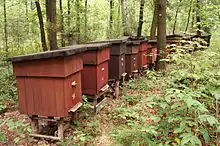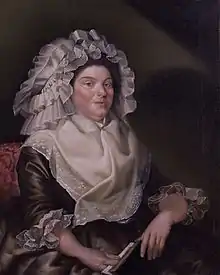ruche
English
Etymology
Borrowed from French ruche, from Middle French rusche, from Medieval Latin rusca (“bark”), from Gaulish *ruskā, from Proto-Celtic *rūskos (“bark”). Compare Breton rusk, Irish rúsc, Welsh rhisgl and Catalan rusc.
Pronunciation
- IPA(key): /ɹuːʃ/
Audio (Southern England) (file) - Rhymes: -uːʃ
Noun
ruche (plural ruches)
- A strip of fabric which has been fluted or pleated.
- A small ruff of fluted or pleated fabric worn at neck or wrist.
- 1903, Henry James, The Ambassadors:
- Mrs. Newsome wore at operatic hours a black silk dress—very handsome, he knew it was "handsome"—and an ornament that his memory was able further to identify as a ruche.
- A pile of arched tiles, used to catch and retain oyster spawn.
Derived terms
- ruching (noun)
Translations
Verb
ruche (third-person singular simple present ruches, present participle ruching, simple past and past participle ruched)
- To flute or pleat (fabric).
- ruched curtains
- 1864, Frank Leslie's Lady's Magazine:
- At each seam the dress opens to a-point over a silk petticoat. The skirt is ruched around the bottom and the openings, between which are bows of ribbon and lace.
- 1899, The Country Gentleman, page 337:
- This will consist in large part of a half-dozen inexpensive flowered organdies, which she has picked up at various sales for from ten to twenty cents a yard. She has had all of them made with low waists, ruffled or ruched around the corsage, ...
- 1984, Natalie Rothstein, Madeleine Ginsburg, Avril Hart, Four hundred years of fashion, page 138:
- The matching skirt consists of a drape of pink figured silk, tucked up at the hips to show tiers of machine-made lace frills and pleats […] It is ruched in front and has a train box-pleated into the back.
- To bunch up (fabric); to ruck up.
- 2014, Harriet Evans, Not Without You, Simon and Schuster, →ISBN, page 47:
- Joe Baxter pulled the dress farther down, so it was ruched around my middle, the bottom half pulled up to my stomach.
- 2017, Laura Trentham, An Indecent Invitation: Spies and Lovers Book 1, Laura Huskins, →ISBN:
- A woman with an agonized expression on her up-turned face sat with her knees apart while a man buried his head between her legs. Her dress was ruched around her waist, and her breasts were bared. Gilmore's scandalous, erotic art.
- 2018, Raquel Byrnes, Tremblers, Pelican Ventures Book Group, →ISBN:
- Clad in a leather bodice and black skirts ruched up past her knees, the wild-haired rescuer pushed a pair of brass goggles up onto her mop of red locks and squinted. “Well, this is a fine mess,” she said.
Bourbonnais-Berrichon
Alternative forms
- rutse, reuche (Berrichon), ruiche (Berrichon)
Central Franconian
Etymology
From Middle High German rūchen, from Old High German *rūhhan, northern variant of riohhan.
Pronunciation
- IPA(key): /ˈʀuxə/
French


Etymology
Inherited from Middle French rusche, from Medieval Latin rusca (“bark”), from Gaulish *ruskā, from Proto-Celtic *rūskos (“bark”).
Compare Breton rusk, Irish rúsc, Welsh rhisgl and Catalan rusc.
Pronunciation
- IPA(key): /ʁyʃ/
Audio (file)
Derived terms
- rucher
- rucheur
Further reading
 ruche on the French Wikipedia.Wikipedia fr
ruche on the French Wikipedia.Wikipedia fr- “ruche”, in Trésor de la langue française informatisé [Digitized Treasury of the French Language], 2012.
Middle English
Norman
Etymology
From Old French rusche, from Early Medieval Latin rusca (“bark”), from Gaulish *ruskā, from Proto-Celtic *rūsklos (“bark”). Compare Breton rusk, Irish rúsc, Welsh rhisgl and Catalan rusc.